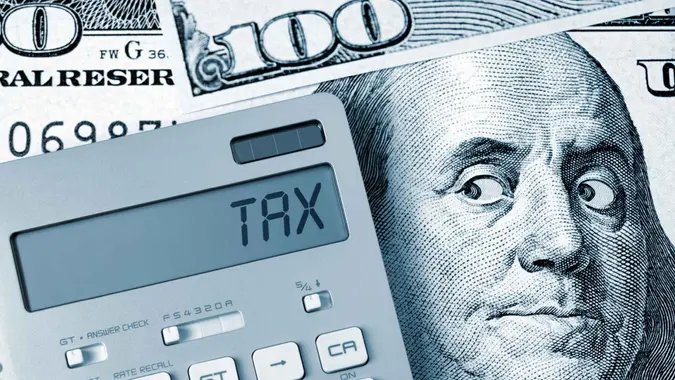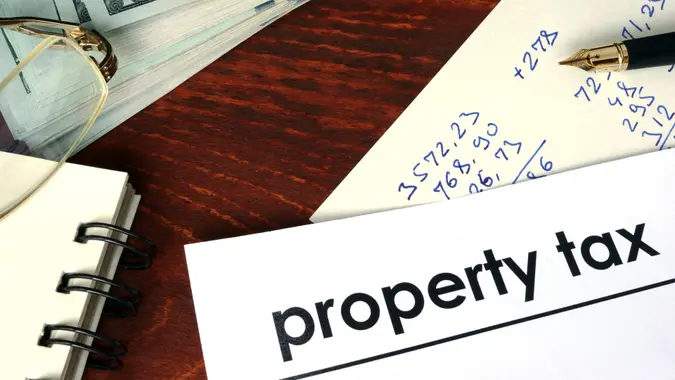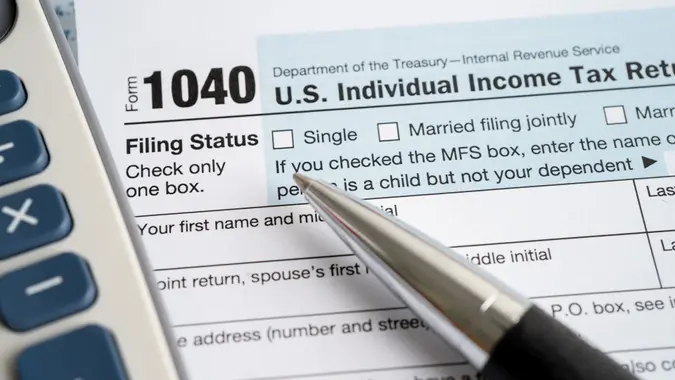These Are the Receipts To Keep for Doing Your Taxes

Commitment to Our Readers
GOBankingRates' editorial team is committed to bringing you unbiased reviews and information. We use data-driven methodologies to evaluate financial products and services - our reviews and ratings are not influenced by advertisers. You can read more about our editorial guidelines and our products and services review methodology.

20 Years
Helping You Live Richer

Reviewed
by Experts

Trusted by
Millions of Readers
Gathering and saving receipts and tax documents is an important part of filing taxes and receiving your refund quickly.
Find:
Whether you take the standard deduction or itemize deductions, most people filing their 2022 taxes in 2023 will be happy they took the time to prepare when the IRS deadline rolls around.
Review which receipts to keep for taxes — the information below will help to make tax preparation less painful and ensure you take all of your eligible deductions.
What Receipts Should I Keep for Taxes?
If you’re not sure what receipts you need to prepare your tax return, consider seeking the help of a tax professional. They can help you evaluate your tax situation and identify the types of deductions you’re entitled to take, and advise you as to what receipts you’ll need to document expenses. Not only can turning your taxes over to a pro maximize your refund — it might even help you avoid overpaying in the first place.
Whether you tackle your own taxes or leave them to a professional preparer, make sure you know how to save and organize your receipts — the last thing you want is to not have the documents you need to defend yourself during an IRS audit.
Receipts To Keep for Small-Business and Self-Employment Taxes
Self-employed individuals should consider using QuickBooks or similar accounting software, according to Bonnie Lee, an enrolled agent and owner of Taxpertise in Sonoma, California.
“The scope of an audit of a small business is reduced considerably when the auditor discovers that adequate books and records, checkbook reconciliation and all other bookkeeping tasks are being performed on professional software,” said Lee.
Your recordkeeping system should include a summary of all your business transactions, the IRS notes. Receipts and other supporting documents provide evidence of those transactions.
Gross Receipts
Keep your gross receipts because they show the income for your business, which you must include when you file your taxes. Gross receipts to save for taxes can include:
- Cash register tapes
- Deposit information
- Receipt books
- Invoices
- Forms 1099-MISC
Purchase Receipts
Don’t forget to save your receipts for business purchases, which are things you buy and resell to consumers.
- Canceled checks or receipts that show the payee, amount and proof of payment
- Cash register tape receipts
- Credit card receipts and statements
- Invoices
Business Expense Receipts
Your expenses are the costs of running your business, other than your purchases. Take some expert advice on what receipts to keep for business taxes.
Sometimes canceled checks are not enough to support a deduction, according to Lee. “A check made out to Costco is not proof of a business expense because you could be buying groceries and other personal items. Credit card charges for a business trip to Maui will smell like a vacation unless you can provide other documentation to support the business purpose. So be sure to keep the receipts, business conference flyers, etc., to defend business usage,” said Lee.
Keep these expense receipts for taxes:
- Canceled checks
- Cash register tapes
- Account statements
- Credit card receipts and statements
- Petty cash slips
- Invoices
Also keep all of your credit card receipts. They can help document your expenses.
When you sell any business assets — such as the real estate, furniture or machinery you use — you’ll need to keep the purchase and sales agreements as well as a copy of the receipt. You’ll also need the purchase receipts if you use depreciation on your business assets as tax write-offs.
Personal Income Tax Receipts To Keep
Business owners aren’t the only ones who should be keeping receipts. Many taxpayers qualify for tax deductions that could require proof in the form of a receipt.
Keep these documents as well:
- Receipts for purchases that qualify for special tax benefits such as an educator expense deduction
- Supporting receipts and documents for eligible home improvement costs on real estate
- Receipts for eligible medical expenses and dental costs, such as out-of-pocket payments for doctors, hospital stays and prescriptions as well as spending associated with traveling to and from medical appointments, including parking and tolls
- Documentation showing tax-deductible donations of cash, checks and other monetary gifts, regardless of the amount
- Receipts for dependent care expenses if you’re a working parent or incurred the expenses while looking for work
- Energy-saving home improvement receipts
- Receipts showing state and local sales tax you paid on purchases — if the sales tax exceeds your state income tax withholding or you live in a state with no personal income tax
- Receipts for qualified education expenses such as tuition, fees, books and supplies
How To Organize Receipts for Taxes
Whether you expect to pay taxes or get a refund, managing receipts for taxes doesn’t need to be complicated. The key is knowing how to save receipts and file them in an orderly fashion.
Maintain paperless records by scanning receipts, or use an app like Expensify to photograph them with your smartphone and sort them into categories. Doing this will simplify the process of calculating deductions and tax credits when you fill out your income tax return. Just make sure you’re able to print the receipts for your tax preparer or, in the event of an audit, the IRS.
Alternatively, save your receipts in boxes or files if you prefer a more traditional route. You can also find a ready-made receipt organizer to keep paper receipts safe and organized.
No matter which tax receipt organization style suits you, arrange your documents by year and category.
How Long To Keep Tax Records and Receipts
You should save general tax records for at least three years, according to Josh Zimmelman, owner of Westwood Tax & Consulting LLC in Rockville Centre, New York. “The IRS has three years to ask for an audit,” said Zimmelman. “But they can ask for records up to six years after filing if you failed to report 25% or more of your gross income.”
Another expert, Deltrease Hart-Anderson, an enrolled agent in West Columbia, S.C., gave an alternative perspective. “I tell both business and individual clients to save receipts for at least 10 years, but I add a disclaimer: If you have room, save them forever,” said Hart-Anderson. The IRS can audit an indefinite number of years of your tax returns if feels that you’ve filed a fraudulent tax return.
Receipts can help you maximize your refund, or at least minimize your tax burden. But when it comes to collecting and keeping tax records and receipts, the guidance of a tax professional or financial advisor remains the safest bet. Not only will you receive advice best suited for your tax situation, but you can also stay focused on the arduous but profitable task of receipt record maintenance.
More From GOBankingRates
- 4 Things Boomers Should Never Sell in Retirement
- 5 Japanese Cars To Stay Away From Buying
- Trying to Build Your Savings? Make Sure Your Account Does These 6 Things
- 5 Myths About Debt That Nobody Should Believe in 2024
Daria Uhlig and Will Healy contributed to the reporting for this article.
 Written by
Written by  Edited by
Edited by 
























